Biden Says US Will Retaliate Against Iran If It Harms Interests
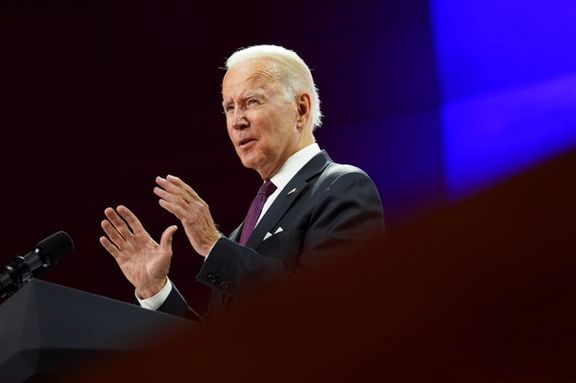
President Joe Biden has said on Sunday that the United States will "respond" to actions Iran has taken against Washington's interests, including drone strikes.

President Joe Biden has said on Sunday that the United States will "respond" to actions Iran has taken against Washington's interests, including drone strikes.
“With regards to the issue of how we’re going to respond to their actions against interest of the US, whether they are drone strikes or anything else, is we’re going to respond,” Biden said in a press conference following the G20 summit in Rome.
A Us base in Syria came under attack recently with drones suspected to have been launched by Iran-backed militias.
Officials said on October 25 that the US believes that Iran resourced and encouraged the attack, but that the drones were not launched from Iran. They were Iranian drones, and Iran appears to have facilitated their use, officials said, speaking on condition of anonymity to discuss details that have not been made public.
Iranian backed militias have also attacked bases hosting US troops in Iraq, recently using drones more often than rockets.
The US Treasury Department on Friday sanctioned two senior members of Iran’s Revolutionary Guard (IRGC) and two affiliated companies for supplying lethal drones to insurgent groups in Iraq, Lebanon, Yemen, and Ethiopia.
Biden's threat comes as the US and its European allies urge Iran to return to nuclear talks aimed at restoring the 2015 Iran deal.
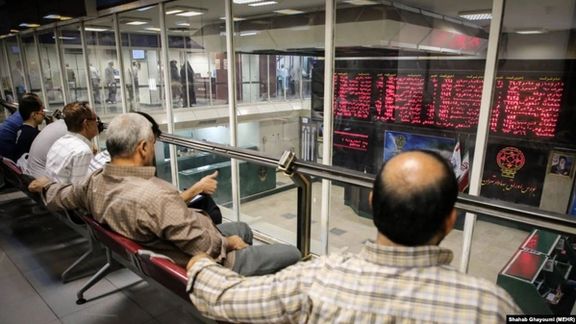
Another big decline in Iran’s stock market on Sunday has highlighted the precarious state of the economy amid uncertainty over the future of nuclear talks.
The Tehran stock market index dropped by about 30,000 points, bringing it close to 1.2 million points, down from more than 1.4 million in early August when President Ebrahim Raisi (Raeesi) took office promising to boost capital markets.
Fararu, a leading news website in Iran, said that economic uncertainty resulting from a lack of progress in nuclear talks with the West is the main reason for the continuous decline of the stock market. An expert in capital markets told the website that there is a lack of investment capital and market lethargy.
The government which faces a huge budget deficit issued more bonds in August, which drained the capital markets. One expert said that the government and the central bank are using the stock market as a source of financing.
At the same time, First Vice President Mohsen Rezaei, who is one of Raisi’s top officials in charge of the economy told parliament on Sunday that the government will never print more money without proper backing, which would mean hard currency reserves. Iran has been spending its reserves to make up for lost oil exports, banned by US sanctions.
Iran has accelerated its money printing since 2018 when the United States withdrew from the 2015 nuclear agreement (JCPOA) and imposed sanctions on Iran. Liquidity has quadrupled since 2017, dragging down the value of the national currency ninefold.
The rial is hovering around 275,000 to the dollar, showing no appetite for appreciation.
While Rezaei was promising a cap on liquidity, hardliners were demanding that the Central Bank of Iran (CBI) not to deny money to an ambitious Raisi project of building one million affordable homes in the next 10 months. Most economists in Iran have called the project an impossible plan, given the fact that it would need $10-15 billion dollars the government does not have.
But Rezaei, who has a military background in the Revolutionary Guard with no economic management experience tried to sound upbeat in his meeting with the parliament. He said people can expect good economic news in December. But what he mentioned were old formulas of more government control over prices and compensating ordinary people who have to endure a 50-percent inflation rate.
He even invited expat Iranian to bring their “intellectual and financial capital back to Iran” and invest in the future. This seems to be another optimistic expectation given the fact that up to $100 billion is said to have left the country in the past decade.
President Raisi’s first three months in office is coming to a close next week with no visible improvement in the economy. Critics already began demanding action instead of words in mid-October, while the president appeared to be issuing daily orders to officials to solve deep-rooted problems that cannot be addressed without the lifting of US sanctions.
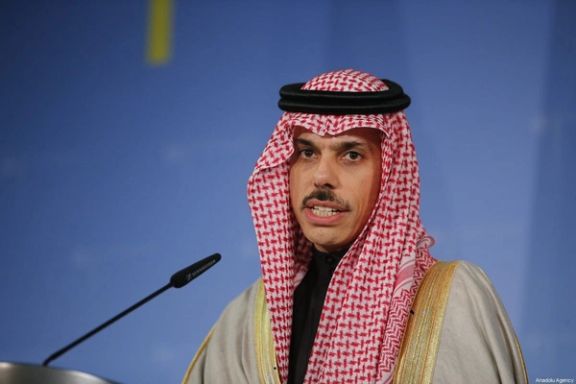
Iran and Saudi Arabia both say that they are willing to continue talks they started in April but not much progress has been made, with embassies still closed.
Iran’s foreign ministry said Sunday that after four rounds of talks with Saudi Arabia, reopening of embassies “will take some time”, after the Saudi foreign minister said not much progress has been made.
The Iranian foreign ministry spokesman Saeed Khatibzadeh was quoted by local media as saying that the two sides have achieved preliminary agreements, but the two countries are waiting for the finalization of the talks.
Saudi Arabia’s Foreign Minister Faisal bin Farhan Al Saud had told CNBS in Rome on Saturday that talks with Iran are continuing but no “solid progress had been made.” He indicated that another round of talks will follow, saying, “We haven’t really reached any conclusive progress. But they have been, I would say, positive enough to allow for further discussion beyond, but nothing concrete as of yet.”
Iran has embarked on a much-touted policy of improving relations with neighbors as it grapples with Western powers over its nuclear program. The West besides asking Iran for a full return to the 2015 nuclear deal (JCPOA), is also raising the issue Tehran’s aggressive policies in the region.
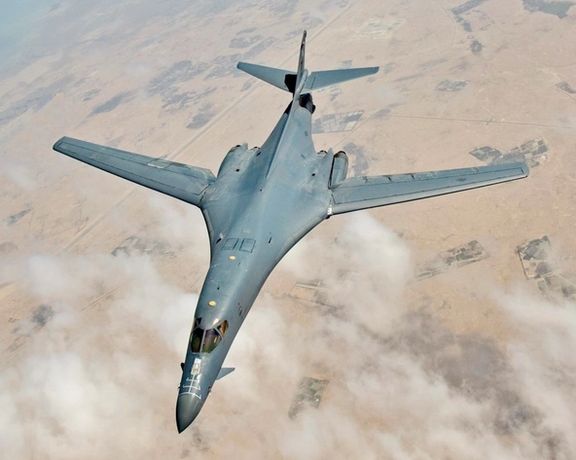
The US Air Force flew a B-1B strategic bomber over key maritime chokepoints in the Middle East with allies, including Israel, amid ongoing tensions with Iran.
The B-1B Lancer bomber flew Saturday over the Strait of Hormuz, the narrow mouth of the Persian Gulf through which 20% of all oil traded passes.
It also flew over the Red Sea, its narrow Bab el-Mandeb Strait and Egypt's Suez Canal.
The Strait of Hormuz has been the scene of attacks on shipping which have been blamed on Iran over recent years, while the Red Sea has seen similar assaults amid an ongoing shadow war between Tehran and Israel.
The Islamic Republic has denied involvement in the attacks, though it has promised to take revenge on Israel for a series of attacks targeting its nuclear program.
Fighter jets from Bahrain, Egypt, Israel and Saudi Arabia flew alongside the bomber.
The flyover is the first in a pattern of such flights by nuclear-capable B-52 bombers since the Trump administration, as a show of force to Iran.
Biden sending a B1-B bomber into the region allows him to send "a clear message of reassurance" to regional allies, the US Air Force's Central Command said in a Twitter post.
Report by AP
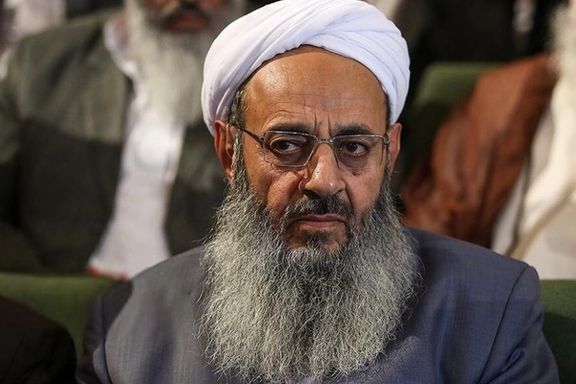
A leading Sunni cleric in Iran, who was known in the past as a rights defender has said he hopes the Taliban “can become muscle for the Islamic Republic”.
Molavi Abdolhamid is the religious leader of Iran’s largely Sunni Baluch population living in the southeast near Pakistan and Afghanistan. Over the years, he was an outspoken defender of equal rights for all religions and ethnic groups in Iran but since the Taliban victory in August has become a supporter of the extremist group implicated n hundreds of attacks on civilians.
Abdolhamid in an interview with a local website has called on other countries not “to pre-judge the Taliban”, arguing that the group has changed, and its critics are exaggerating their shortcomings.
Iran’s ruling hardliners also welcomed the Taliban victory in Afghanistan, labeling it as a “strategic defeat for the United States”, but officials now are more circumspect, demanding that the Taliban should form an “inclusive government”.
Abdolhamid’s pro-Taliban statements have led to criticism among Iranians. An Iranian rights group which had bestowed an award on the Sunni cleric for defending human rights took it back in August.
The Taliban have continued their restrictive policies against women in Afghanistan and in some provinces have mistreated Shiite minorities.
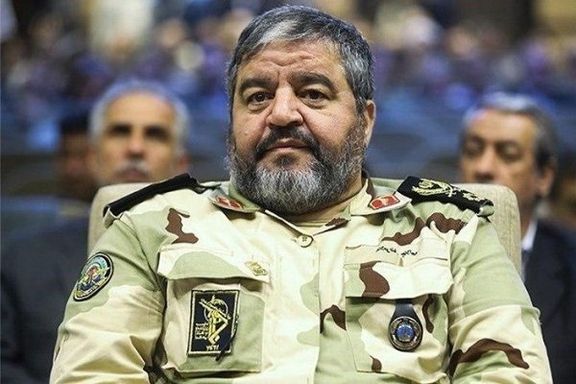
Iran’s civil defense chief on Saturday accused Israel and the United States of being behind a cyberattack which disrupted gasoline sales across the country.
Gholamreza Jalali, an Islamic Revolution Guard Corps IRGC general said this is not yet proven and a technical investigation was yet to be completed.
"We are still unable to say forensically, but analytically I believe it was carried out by the Zionist Regime, the Americans and their agents," Jalali, head of Passive Defense Organization (PDO) which is in charge of cyber security, told state TV in an interview.
A nationwide disruption of special payment cards on Tuesday led to havoc at gas stations across Iran. The payment system that was hit is a digital network that controls subsidized, cheap fuel each Iranian receives monthly. Once the system was disrupted, people had to pay double in cash to pump gas.
The cheapest, rationed fuel is about 20 US cents a gallon, while the regular price for gasoline is around 40 cents, the second cheapest in the world after Venezuela.
Iran has said in the past few years that it is on high alert for online assaults, which it has blamed on its arch-foes the United States and Israel. The United States and other Western powers meanwhile have accused Iran of trying to disrupt and break into their networks.
Jalali accused the administration of former president Hassan Rouhani of "not taking cyberwarfare seriously and ignoring it" and claimed that his organization has reached an understanding with the ultraconservative administration of President Ebrahim Raisi "to make up for the setbacks during the previous administration. The PDO will inform the judiciary of the identity of those who caused the attack by neglecting or not carrying out the required precautions.
President Ebrahim Raisi said this week that the cyberattack was designed to create "disorder". But experts have said the payment system was not connected with the Internet.
The disruptions on Tuesday came ahead of the second anniversary of bloody protests in Iran over a sharp increase in fuel prices in November 2019 that turned political with protesters demanding the country's top rulers step down. Security forces killed up to 1,500 people during the unrest using military weapons.
Jalali said that, based on completed investigations, Iran was "certain" that the United States and Israel were behind the cyberattacks on Iran's railroads in July and the Shahid Rajaee Port in May 2020.
Iran's train services were delayed in July by apparent cyberattacks, with hackers posting the phone number of Supreme Leader Ayatollah Ali Khamenei's office as the number to call for information.
About half of Iran's 4,300 gas stations were now reconnected and resuming the sale of heavily subsidized fuel, the state news agency IRNA said on Saturday. Hours after the cyberattack, gas stations reopened gradually but could only be operated manually for the sale of more expensive fuel.
Speculation among Iranian on social media was rampant after the incident, with some saying that the disruption was intentional by the government who wants to reduce subsidies amid a deep economic crisis triggered by US sanctions.
The PDO which is affiliated to the Armed Forces General Command (AFGC) is responsible for policymaking, planning, and operating passive and civil defense activities of government agencies including measures against cyber, biological, radioactive, chemical, and economic threats.
The organization's exact budget is not known but it receives 2% of the budget of all government organizations and agencies to implement its measures against threats in addition to the budget that it receives from the AFGC.